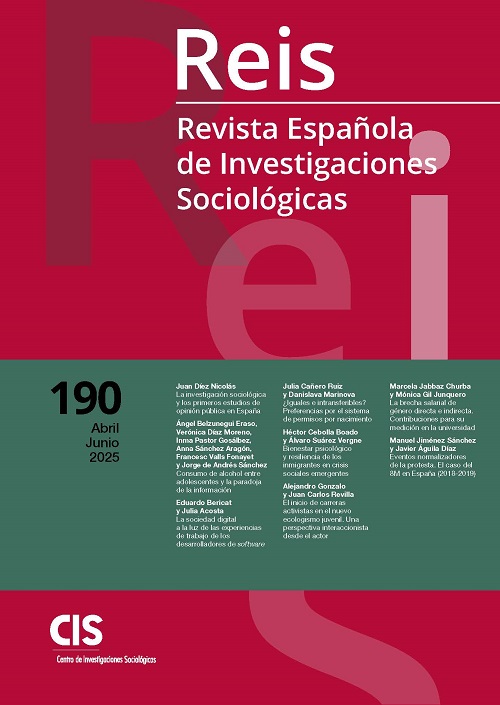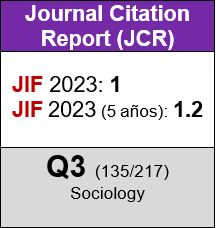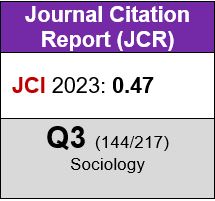El inicio de carreras activistas en el nuevo ecologismo juvenil. Una perspectiva interaccionista desde el actor
DOI:
https://doi.org/10.5477/cis/reis.190.111-118Palabras clave:
Participación política, juventud, movimientos sociales, activismo climáticoResumen
En este artículo mostramos los comienzos de las carreras activistas de aquellos jóvenes que protestaron contra la crisis climática a partir de las intensas movilizaciones de 2019. La noción de carrera, como sucesión de cambios con una dimensión objetiva y una dimensión subjetiva, permite mostrar cómo se involucraron los nuevos activistas, el proceso de aprendizaje y estabilización de la participación y los elementos que pueden sostener o frustrar una implicación continuada. Para ello realizamos una investigación cualitativa que incluye observaciones participantes y entrevistas en Fridays For Future y Extinction Rebellion. Los resultados muestran dos claves: la importancia de las emociones, activando nuevos marcos y creando motivaciones para sostener la participación, y la necesidad de la afinidad del participante con el colectivo en normas, estrategias y perfil, produciendo procesos de auto-selección.
Descargas
Citas
Agrikoliansky, Éric (2017). «Las "carreras militantes": alcance y límites de un concepto narrativo». En: O. Fillieule; F. Haegel; C. Hamidi y V. Tiberej (eds.). Sociologie plurielle des comportements politiques (167-192). Presses de Sciences Po (PFNSP) (Matari P. Translated)
Becker, Howard (1963). Outsiders. Paris: Métailié.
Belli, Simone; Revilla, Juan C.; Sánchez, Sara y Gonzalo, Alejandro (2022). «Marcos discursivos de un movimiento ecologista emergente y su impacto virtual». Revista Española de Sociología, 31 (2): a100. doi: 10.22325/fes/res.2022.100 DOI: https://doi.org/10.22325/fes/res.2022.100
Berglund, Oscar y Schmidt, Daniel (2020). Extinction Rebellion and Climate Change Activism. London: Palgrave Macmillan. DOI: https://doi.org/10.1007/978-3-030-48359-3
Collins, Randall (1975). Conflict Sociology. New York: Academic Press
Collins, Randall (2005). Interaction Ritual Chains. Princeton: Princeton University Press.
Corrigall-Brown, Catherine (2011). Patterns of Protest: Trajectories of Participation in Social Movements. California: Stanford University Press DOI: https://doi.org/10.1515/9780804778190
De Moor, Joost; De Vydt, Michiel; Uba, Katrine y Wahlström, Mattias (2020). «New kids on the block: taking stock of the recent cycle of climate activism». Social Movement Studies, 40(1): 619-625. doi: 10.1080/14742837.2020.1836617 DOI: https://doi.org/10.1080/14742837.2020.1836617
Fillieule, Oliver (2001). «Propositions pour une analyse processuelle de l'engagement individuel». Revue française de science politique, 51 (1-2): 199-215. doi: 10.3406/rfsp.2001.403613 DOI: https://doi.org/10.3406/rfsp.2001.403613
Fillieule, Oliver (2005). Temps biographique, temps social et variabilité des retributions. En: O. Fillieule (ed.). Le Désengagement militant. Paris: Belin.
Flam, Helena (2005). Emotions’ map: a research agenda. En: H. Flam y D. King (eds.). Emotions and social movements. London: Routledge.
Gamson, William A. (1992). Talking Politics. Cambridge: Cambdrige University Press.
Goodwin, Jeff (1997). «The libidinal constitution of a high-risk social movement». American Sociologist Review, 62: 53-69. DOI: https://doi.org/10.2307/2657452
Gottraux, Philippe (1997). Socialisme ou Barbarie. Un engagement politique et intellectuel dans la France de l’après-guerre. Lausanne, Payot.
Haluza-DeLay (2008). «A Theory of Practice for Social Movements: Environmentalism and Ecological Habitus». Mobilization, 13(2): 205-218. DOI: https://doi.org/10.17813/maiq.13.2.k5015r82j2q35148
Hayes, Graeme; Doherty, Brian y Saunders, Clare (2020). A New Climate Movement? Extinction Rebellion’s Activists in Profile, 25: 1-39 (CUSP Working Paper Series).
Jacobsson, Diana (2020). «Young vs old? Truancy or new radical politics? Journalistic discourses about social protests in relation to the climate crisis». Critical Discourse Studies, 18(4): 481-497. doi: 10.1080/17405904.2020.1752758 DOI: https://doi.org/10.1080/17405904.2020.1752758
Jasper, James M. (1997). The Art of Moral Protest. Culture, Biography, and Creativity in Social Movements.Chicago: The University of Chicago Press. DOI: https://doi.org/10.7208/chicago/9780226394961.001.0001
Jasper, James M. (2011). «Emotions and Social Movements: Twenty Years of Theory and Research». Annual Review of Sociology, 37: 285-303. DOI: https://doi.org/10.1146/annurev-soc-081309-150015
Lorenzini, Jasmine y Rosset, Jan (2024). «Emotions and climate strike participation among young and old demonstrators». Social Movement Studies, 23(1): 39-55. doi: 10.1080/14742837.2023.2178406 DOI: https://doi.org/10.1080/14742837.2023.2178406
Maier, Benedickt (2019). "No Planet B": An analysis of the collective action framing of the social movement Fridays for Future. Suecia. [Master thesis]. Disponible en: https://www.diva-portal.org/smash/search.jsf?dswid=946
McAdam, Doug (1989). «The Biographical Consequences of Activism». American Sociological Review, 54 (5): 744-760. DOI: https://doi.org/10.2307/2117751
Ojala, Maria (2012). «Hope and climate change: The importance of hope for environmental engagement among young people». Environmental Education Research, 18: 625-642. DOI: https://doi.org/10.1080/13504622.2011.637157
Pleyers, Goeffrey (2016). De la subjectivation à l’action. Le cas des jeunes alter-activistes. En: G. Pleyers y B. Capitaine (eds.). Mouvements sociaux. Quand le sujet devient acteur (pp. 27-47). Paris: Fondation Maison des Sciences de l’Homme. DOI: https://doi.org/10.4000/books.editionsmsh.9897
Revilla, Juan C.; Gonzalo, Alejandro; Davila, María C.; Zlobina, Anna y Belli, Simone (2023). La emergencia de la nueva generación ecologista juvenil en España desde 2019: el caso de Fridays For Future. Centro reina Sofía sobre adolescencia y juventud.
Soler-i-Martí, Roger; Ferrer-Fons, Mariona y Terren, Ludovic (2020). «The interdependency of online and offline activism: A case study of Fridays For Future-Barcelona in the context of the COVID-19 lockdow». Hipertext net, (21): 105-114. doi: 10.31009/hipertext.net.2020.i21.09 DOI: https://doi.org/10.31009/hipertext.net.2020.i21.09
Viejo, Raimundo (2008). Frame Analysis: Encuadre teórico, operacionalización empírica, líneas de investigación. Barcelona: Seminario IGOP.
Williamson, Elizabeth (2011). «The Magic of Multiple Emotions: An Examination of Shifts in Emotional Intensity During the Reclaiming Movement’s Recruiting ⁄ Training Events and Event Reattendance». Sociological Forum, 26(1): 45-70. doi: 10.1111/j.1573-7861.2010.01224.x DOI: https://doi.org/10.1111/j.1573-7861.2010.01224.x
Woods, Michael; Anderson, Jon; Guilbert, Steven y Watkin, Suzie (2012). «‘The country(side) is angry’: emotion and explanation in protest mobilization». Social & Cultural Geography, 13(6): 567-585. doi: 10.1080/14649365.2012.704643 DOI: https://doi.org/10.1080/14649365.2012.704643
Descargas
Publicado
Cómo citar
Número
Sección
Licencia
Derechos de autor 2024 Revista Española de Investigaciones Sociológicas

Esta obra está bajo una licencia internacional Creative Commons Atribución-CompartirIgual 4.0.
Permite Compartir — copiar y redistribuir el material en cualquier medio o formato, Adaptar — remezclar, transformar y construir a partir del material para cualquier propósito, incluso comercialmente.








